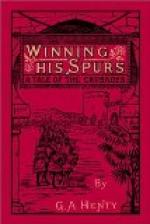CHAPTER I.
The outlaws.
It was a bright morning in the month of August, when a lad of some fifteen years of age, sitting on a low wall, watched party after party of armed men riding up to the castle of the Earl of Evesham. A casual observer glancing at his curling hair and bright open face, as also at the fashion of his dress, would at once have assigned to him a purely Saxon origin; but a keener eye would have detected signs that Norman blood ran also in his veins, for his figure was lither and lighter, his features more straightly and shapely cut, than was common among Saxons. His dress consisted of a tight-fitting jerkin, descending nearly to his knees. The material was a light-blue cloth, while over his shoulder hung a short cloak of a darker hue. His cap was of Saxon fashion, and he wore on one side a little plume of a heron. In a somewhat costly belt hung a light short sword, while across his knees lay a crossbow, in itself almost a sure sign of its bearer being of other than Saxon blood. The boy looked anxiously as party after party rode past towards the castle.
“I would give something,” he said, “to know what wind blows these knaves here. From every petty castle in the Earl’s feu the retainers seem hurrying here. Is he bent, I wonder, on settling once and for all his quarrels with the Baton of Wortham? or can he be intending to make a clear sweep of the woods? Ah! here comes my gossip Hubert; he may tell me the meaning of this gathering.”
Leaping to his feet, the speaker started at a brisk walk to meet a jovial-looking personage coming down from the direction of the castle. The new comer was dressed in the attire of a falconer, and two dogs followed at his heels.
“Ah, Master Cuthbert,” he said, “what brings you so near to the castle? It is not often that you favour us with your presence.”
“I am happier in the woods, as you well know, and was on my way thither but now, when I paused at the sight of all these troopers flocking in to Evesham. What enterprise has Sir Walter on hand now, think you?”
“The earl keeps his own counsel,” said the falconer, “but methinks a shrewd guess might be made at the purport of the gathering. It was but three days since that his foresters were beaten back by the landless men, whom they caught in the very act of cutting up a fat buck. As thou knowest, my lord though easy and well-disposed to all, and not fond of harassing and driving the people as are many of his neighbours, is yet to the full as fanatical anent his forest privileges as the worst of them. They tell me that when the news came in of the poor figure that his foresters cut with broken bows and draggled plumes—for the varlets had soused them in a pond of not over savoury water—he swore a great oath that he would clear the forest of the bands. It may be, indeed, that this gathering is for the purpose of falling in force upon that evil-disposed




